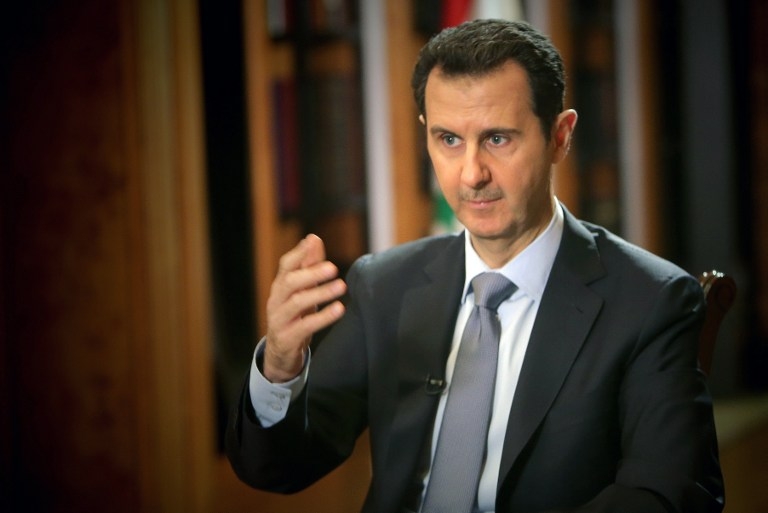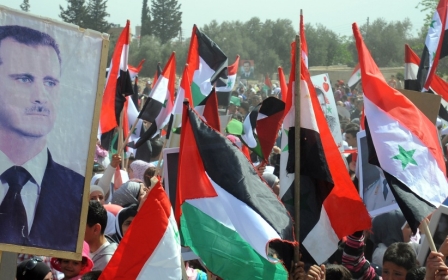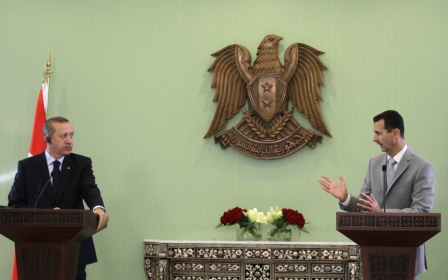Syria's Assad confirms bid in vote seen as 'parody of democracy'

Syrian President Bashar al-Assad has registered to run in a presidential election to be held next month, the parliament speaker announced Monday.
The election will be Syria's first multi-candidate presidential vote, after changes to the constitution, but the planned vote has already been criticised by the opposition and much of the international community.
The government has not explained how it will hold the vote in a country gripped by a brutal war that has killed more than 150,000 people and left large swathes of territory beyond regime control.
Speaking at a session of parliament, speaker Mohamed al-Lahham read a letter from Assad announcing his candidacy.
"I, citizen Bashar Hafez al-Assad, wish to present my candidacy for the post of president of the republic," the document said.
New MEE newsletter: Jerusalem Dispatch
Sign up to get the latest insights and analysis on Israel-Palestine, alongside Turkey Unpacked and other MEE newsletters
A posting on the presidency's official Facebook page quoted Assad as calling on supporters of different candidates to express themselves through the ballot box.
"Those who wish to express their joy and support for any candidate for the presidency should do so in a responsible, patriotic way, first, and secondly, through the ballot box in a timely fashion," he said. "I call on all Syrian citizens to refrain from firing in the air in joy, whatever the occasion might be, especially as Syria will be having its first election in modern history."
In Damascus, as children left school, dozens of young girls and boys chanted their approval of his candidacy, shouting "God, Bashar, and that's all".
Assad is expected to sail to victory against a list that so far contains six other candidates.
The candidates include Sawsan Haddad, a mechanical engineer from Latakia; Samir Maala, an international law professor from Quneitra; Mohammed Firas Rajjuh, born in Damascus in 1966; Abdel-Salam Salameh, a 42-year-old from Homs; Hassan Abdullah al-Nuri, a businessman who studied in the United States, and independent MP and former communist Maher al-Hajjar.
Aside from al-Hajjar, the candidates are largely unknown and it remains unclear how they will angle their campaigns against Assad.
New election rules prevent anyone who has lived outside Syria in the past decade from running, effectively preventing the opposition-in-exile from taking part in the vote.
Would-be presidential candidates must win the support of at least 35 of Syria's 250 MPs to run. Of those, 160 are members of Assad's Baath party, which has ruled Syria with an iron fist for nearly 50 years.
The election will be Syria's first multi-candidate presidential vote, after a constitutional amendment did away with a previous referendum-based system.
Assad became president after his father Hafez died in 2000 and will be competing in the first multi-candidate elections for the post, after a constitutional amendment did away with a referendum system.
Electoral rules prevent those who have lived outside Syria for the past decade from competing, effectively ruling out participation by the opposition-in-exile.
'Parody of democracy'
With nearly half the population displaced, inside and outside the country, it is unclear how many Syrians will be able to vote.
The head of the electoral commission also said Monday that Syrians who left the country "illegally" would not be allowed to vote.
Many of the approximately three million Syrians who have fled the country did so through by being smuggled across the border into neighbouring countries, or crossing through rebel-held border posts.
The main opposition National Coalition has criticised the elections as a "farce" and Washington said the vote would be a "parody of democracy".
Elsewhere in the country, the Syrian Observatory for Human Rights said opposition fighters had announced they would restore electricity to regime-held parts of Aleppo city.
The western part of the city has been without power for more than a week, after the opposition cut high-tension power lines to try to pressure the regime to end aerial raids on the rebel-held east of the city.
But the Observatory, a Britain-based monitor, said Monday that a statement from the Al-Nusra Front jihadist group promised to "restore electricity to all of Aleppo to end the suffering of our people".
Earlier, the Observatory reported that regime helicopters had dropped barrel bombs on the rebel-held Masaken Hanano district of eastern Aleppo.
Rights group have decried the use of the highly destructive, improvised bombs saying they cause indiscriminate civilian casualties.
The Assad regime has increasingly employed them over rebel-held parts of Aleppo, where fighting between the government and rebels has stepped up in recent weeks.
Hundreds of people, mainly civilians, have been killed in a nearly five-month aerial offensive against Aleppo.
More than 150,000 people have been killed in the Syrian conflict since March 2011, according to the Observatory.
Middle East Eye delivers independent and unrivalled coverage and analysis of the Middle East, North Africa and beyond. To learn more about republishing this content and the associated fees, please fill out this form. More about MEE can be found here.



